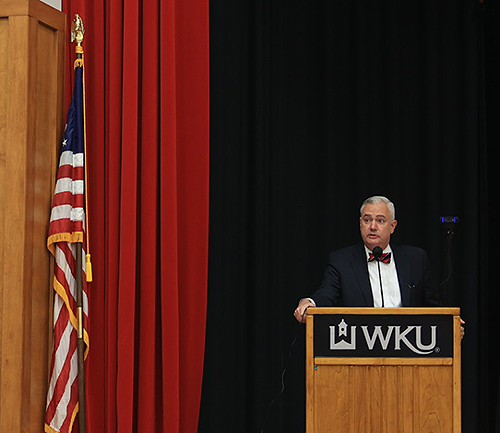WKU News
CPE, WKU host diversity, equity and inclusion symposium
- WKU News
- Tuesday, November 16th, 2021

The Kentucky Council on Postsecondary Education (CPE), in partnership with Western Kentucky University, hosted the 2021 Higher EDquity Symposium on WKU’s campus on Monday and Tuesday (Nov. 15-16). The two-day symposium provided an opportunity for faculty, staff, students, and administrators in higher education to collaborate on issues related to diversity, equity and inclusion.
Dr. Aaron Thompson, the President of the Kentucky Council on Postsecondary Education, stressed the need for equity in higher education. “You can’t have a strong higher education system if you leave some people behind,” he said. “What we know is that all the other priorities around us cannot be fully achieved if we don’t do it in a manner that actually gets everybody to the table.”
Thompson also shared with attendees CPE’s focus on equity in higher education, centered on five priority areas: affordability, transitions, success, talent, and value. “The faculty, the staff, and the administrators on our campuses are some of the smartest people in the world in one location. We need to use that talent to inform and to educate on a variety of issues and to a variety of constituencies,” Thompson said. “We have to have discussions about how we use higher education for the benefit of everyone.”
The theme for this year’s symposium was “Cultivating Culturally Competent Campuses.” Through a combination of keynote speeches and breakout sessions, participants engaged in discussions about the ways in which colleges and universities can create a more culturally competent environment for faculty, staff, and students.
WKU’s President, Dr. Timothy C. Caboni, affirmed the university’s commitment to diversity, equity, and inclusion. “Now, more than ever, our institution remains committed to creating an equitable and inclusive environment where all those on our campus have a sense of belonging,” he said.
President Caboni also noted the importance of all institutions of higher education in Kentucky working together to create inclusive environments. “It’s not the work of one individual or one committee or even one campus; it is the responsibility of our entire network of Kentucky institutions to make a difference,” he said. “We are all charged with educating the next generation of leaders who must solve insurmountable global problems in an increasingly diverse and multifaceted world.”
This was the third annual Higher EDquity Symposium in Kentucky. Dr. Molly Kerby, one of WKU’s Co-Chief Diversity Officers, said it was an honor to be asked to host the event. “Having the conference on our campus shines a light on the work we’ve done toward creating a welcoming, inclusive, and equitable environment for faculty, staff, and students,” she said.
Kerby said it is important for everyone involved in higher education to have these conversations. “Our communities are more diverse than ever before. Learning from and about people whose life experiences are different from our own creates a space for diverse intellectual exchanges of ideas and enriches the social environment for members of our campus community and beyond,” Kerby stated.
Kerby also noted that forums such as this help participants to better understand different points of view. “Creating spaces for open dialogue is key to broadening our understanding and acceptance of one another. This conference is designed to do just that,” she said.
Presentations covered topics including equity in higher education, implicit bias, microaggressions, and creating inclusive environments. Due to the COVID-19 pandemic, participants had the option to attend sessions in-person or virtually.
One of the key goals of the symposium was to assist Kentucky’s colleges and universities in graduating culturally competent students who are prepared to enter the workforce. “The conference bridges the notions of equity and education, with an emphasis on generating a workforce of culturally competent graduates from Kentucky’s state institutions,” Kerby noted. “Including diverse issues in the curriculum and social fabric of our institutions promotes civic engagement and leads to the development of resilient communities.”
Contact: Molly Kerby, molly.kerby@wku.edu.
- WKU -
Western Kentucky University prides itself on positioning its students, faculty and staff for long term success. As a student-centered, applied research university, WKU helps students expand on classroom learning by integrating education with real-world applications in the communities we serve. Our hilltop campus is located in Bowling Green, Kentucky, which was recently named by Reader’s Digest as one of the nicest towns in America, just an hour’s drive from Nashville, Tennessee.
Some of the links on this page may require additional software to view.

